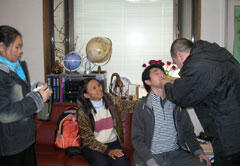Research and Development of Therapeutic Products against Infectious Diseases, especially Dengue Virus Infection
Principal Investigator
-


Prof.
Research Institute for Microbial Diseases, Osaka University
IKUTA Kazuyoshi
ODA Recipient Country
Kingdom of Thailand
Research Institutions in Japan
Osaka University
Research Institutions in Counterpart Country
National Institute of Health (NIH), Ministry of Public Health / Mahidol University (MU)
Adoption fiscal year
FY 2008
Research Period
4 Years
Overview of the Research Project
Finding candidate therapeutic agents for infectious diseases prevalent in Southeast Asia
Dengue fever is a viral disease spread by mosquitoes that infects 50 million people living in the tropics every year, with about 200,000 fatalities, but no effective therapies have yet been established. However, whenever someone is infected by a disease agent, his or her body makes proteins called antibodies. The key role of those antibodies is to control the symptoms of the disease and cure the patient. We are conducting research that involves taking antibodies from dengue fever patients that seem to be useful against the disease, and attempting to use them as medicine. At the same time, we are conducting similar research for influenza, which is a worldwide problem, and for the botulinum toxin, which is a problem in Thailand. We are also searching microorganisms prevalent in Thailand for compounds that are effective as a dengue fever treatment.
Conducting experiments to develop new drugs following the successful creation of antibodies
We have succeeded in creating many antibodies against the dengue virus, influenza virus and botulinum toxin. Many of those antibodies appear to be potentially effective as therapeutic agents. Next, we will perform more detailed evaluations, aiming for the development of new drugs.
Photo gallery
Research Project Web site
Press Release
Links
Projects
Contact Us
Japan Science and Technology Agency (JST)
Department of International Affairs
SATREPS Group
TEL : +81-3-5214-8085
Related articles by Category
- Infectious Diseases Control
Infectious Diseases Control

 Kingdom of Thailand
Kingdom of Thailand
Helping Tuberculosis Patients: Strengthening TB Control Strategies through Genomic Analysis!
Integrative Application of Human and Pathogen Genomic Information for Tuberculosis Control
- Thailand
Environment / Energy
(Carbon Neutrality)
 Kingdom of Thailand
Kingdom of Thailand
Discover the power of microbial symbiosis and help realize a resource-recycling society
Development of the Duckweed Holobiont Resource Values towards Thailand BCG Economy
- Asia
Environment / Energy
(Global-scale environmental issues)
 Socialist Republic of Vietnam
Socialist Republic of Vietnam
From grossly contaminated river water to drinking water!
Establishing Sustainable Water Supply System Resilient to the Contamination of Drinking Water Sources
- SDGs : Goal.3
Environment / Energy
(Global-scale environmental issues)
 Kingdom of Cambodia
Kingdom of Cambodia
Develop human resources to solve air pollution problems in Cambodia! Observation, analysis then countermeasures
Establishment of Risk Management Platform for Air Pollution in Cambodia



















